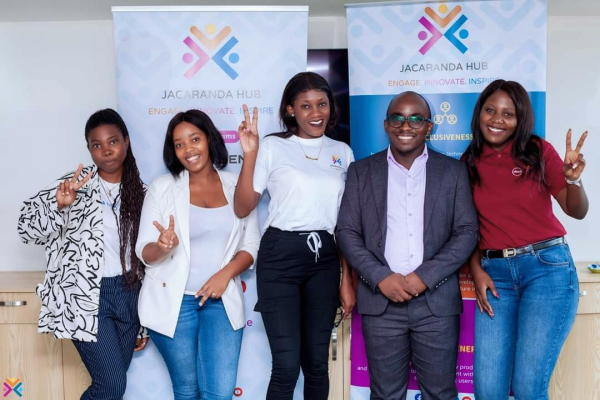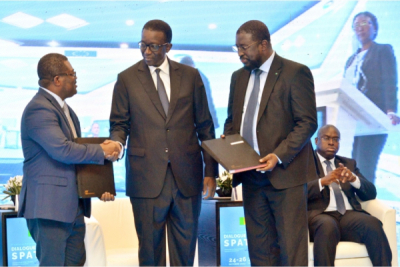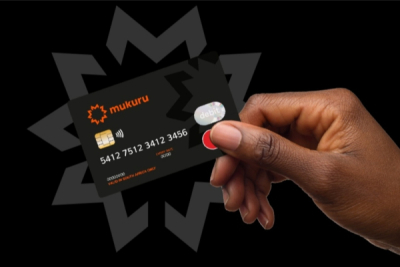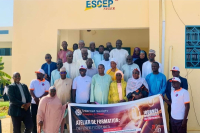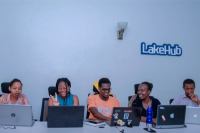In collaboration with its local and international partners, Jacaranda works to provide young people with the opportunities and skills they need to realize their potential and contribute to the progress of their country.
Jacaranda Hub is a Zambian organization that aims to develop the youth’s skills in the fields of information and communication technologies (ICT) and entrepreneurship through its innovation hub. Founded in 2017 by Mara Zhanet Michelo, who is its CEO, its mission is to enable young people to participate in the creation of socio-economic impact and business value.
"Jacaranda Hub’s idea is to find, build, and mold propitious entrepreneurs. I believe that entrepreneurship is the most impactful way of creating sustainable change and development. It stimulates local economic growth, creates jobs, and reduces poverty. Empowering ambitious innovators to solve problems by converting ideas into reality is the ambitious goal that motivated the journey we are embarking on," explained Mara Zhanet Michelo in 2022.
Jacaranda Hub has three thematic axes. The first, JAC-LEARN, offers safe, resource-rich learning spaces with ICT facilities to promote entrepreneurship education, digital literacy, creativity, accessibility, and the ability to use ICT. The second, JAC-STARTUP & INNOVATION, facilitates the creation of an entrepreneurial ecosystem focused on innovation and business development. It supports startups and the creation of viable small and medium-sized enterprises. The final area is JAC-LIFESTYLE, which explores and promotes the concept of social entrepreneurship, the idea of using business to solve major social and environmental problems.
The organization has set up several other initiatives. One of the best-known is the Next Generation National Youth Incubation Challenge for young people aged 18 to 35. The program strengthens young people's ability to design and develop businesses. It focuses on identifying innovative opportunities and supporting young innovators and entrepreneurs through the ideation, validation, and scaling of new products and services that benefit end-users and create successful startups.
It has also set up the Mosi-oa-Tunya Pitch, an investment-readiness program that matches viable startups with local and international investors. The program helps startups with high growth potential to design, measure, and adapt their activities and be ready for investments.
Thanks to Jacaranda Hub and all its programs, Mara Zhanet Michelo was awarded Woman of the Year in Technology at the Techtrends Zambia Awards 2022.
Melchior Koba
The Universal Postal Union has dispatched two technical experts to Chad as part of a mission running from Monday, October 23 to Friday, October 27. The experts will assess the operational readiness of the postal service operator SPTE and train staff on the use of the international mail processing platform (IPS.POST) and the customs declaration system (CDS.POST).
In the past two decades, Africa has increasingly relied on satellite data to accelerate its development. Currently, around ten countries have established their space agencies and are actively pursuing strategies to accomplish their objectives.
On Tuesday, October 24, Senegal’s space agency ASES and the Regional Satellite Communications Organization (RASCOM) signed a memorandum of understanding and strategic partnership on the sidelines of the African Union-European Union Space Dialogue ongoing in Dakar. The agreement aims to strengthen and accelerate Senegal's digitization initiatives by harnessing the capabilities of satellite communication solutions.
As part of the partnership, the two organizations will implement projects to revolutionize various sectors –including telecommunications, agriculture, education, and health– in Senegal through the use of satellite technologies.
The memorandum of understanding reflects Senegal's commitment to becoming a pioneer in the use of space technology to foster innovation in Africa. It is part of the SenSAT space program launched by the government to meet the country's needs in space products and services and to make the space sector a key driver for socio-economic and sustainable development.
For RASCOM, the protocol aligns entirely with its mission of bridging the digital divide in Africa, ensuring comprehensive connectivity in a sustainable and viable way.
The successful implementation of the partnership will help bridge the digital divide in Senegal, by leveraging cutting-edge satellite communication technologies and providing essential public services to the entire population, including those in far-flung areas.
The agreement comes just a few days before the launch of Senegal's first satellite (due on November 10).
Samira Njoya
On Wednesday, October 25, the Guinean Ministry of Technical Education, Vocational Training and Employment announced the signing of a memorandum of understanding with the Chinese technology firm Huawei. The aim is to build smart classrooms at the Kindia Vocational Center and Camara Laye in Conakry.
The sector is digitalized after a pilot phase led by the Ministry of Tourism’s IT and startup development division.
Last Monday, October 23, Côte d’Ivoire presented SITD, its digital platform aggregating information about its tourism industry. Overall, the platform aggregates 22,641 operators, including 19,201 accommodation and catering establishments and 3,440 dedicated to leisure activities.
The platform aims to showcase Côte d’Ivoire’s tourist destinations, provide reliable data for strategic decision-making, and information on market trends throughout the country. It bodes well for the upcoming African Cup of Nations (AFCON) to be held in the country between January and February 2024.
For Tourism Minister Siandou Fofana, who presided over the presentation ceremony in Abidjan, it is a strategic tool unveiled at a time when the country is hosting an AFCON edition focused on innovation and hospitality. “I would like to reassure you that we are fully aware of the challenges posed by such a platform, particularly in terms of cybersecurity and data protection. Strong technical and organizational measures have been taken to ensure that all your information remains secure and compartmentalized," he said.
In recent years, Côte d'Ivoire has embarked on revitalizing its tourism sector. Authorities have taken several actions to promote the country as a leading tourist destination in West Africa. Last August, a three-year agreement was signed with French football club Olympique de Marseille to feature the "Sublime Côte d'Ivoire" brand at the club's stadium, and on their shorts, and training shirts.
During the AFCON Cup, the country will host over twenty football teams with their staff and supporters. In that context, the platform will help them geolocate travel agencies, restaurants, tourist sites, bars and nightclubs, hospitals, clinics, petrol stations, etc.
Adoni Conrad Quenum
The fintech segment is flourishing across Africa, with numerous African tech entrepreneurs striving to provide top-notch services in this sector. This drive has led to a proliferation of diverse fintech solutions.
Mukuru is a fintech solution developed by a South African startup and founded in 2004. It enables South Africans living in the country and the UK to send money anywhere in the world.
"With more and more digital access points over USSD, WhatsApp, and the Mukuru App, for instance, customers are becoming increasingly comfortable with things like self-sign up, including digital KYC and onboarding, which is not only raising our brand presence but is shifting customers that much closer to financial inclusion and higher levels of financial transaction sophistication," said Mukuru CEO, Andy Jury, in 2020.
The solution features a mobile app accessible on iOS, Huawei, and Android. After downloading the application, users can register for their Mukuru accounts with their personal details and access its services, including sending and receiving funds, making online transactions, requesting a Mukuru card, etc...
Thanks to Mukuru, users can send funds via WhatsApp or by dialing a USSD code. The solution aims to reach as many people as possible. In addition to the services listed above, the startup enables users to subscribe to a funeral cover service –A service where users contribute towards a lump sum payment to beneficiaries in the event of one’s death.
The fintech wants to expand to more countries, starting with Southern Africa. Since its launch, the Android version of its mobile application has already been downloaded more than 100,000 times, according to Play Store data.
Adoni Conrad Quenum
Cameroon-based Ocean Innovation Center contributes to accelerating African technological development through its innovative programs and activities. It is supported by the government, through the Ministry of the Economy, Planning, and Regional Development.
Ocean Innovation Center (OIC) is a Cameroonian ICT training and innovation center. Founded by Jacques Bonjawo, a computer engineer and ICT expert, and inaugurated in 2017 by Louis Paul Motaze, Cameroon's then Minister of Economy, Planning and Regional Development, it aims to promote access to digital education, skills development, and entrepreneurship for young people and women.
Located in the heart of Kribi, in the southern region of Cameroon, the Technopole operates from a four-story building, which spans over 2,000 square meters. It offers training courses in computer science, data analysis, full-stack web development, graphic and web design, logical thinking, maintenance and networking, and more. It also offers a coworking space where people can meet and exchange ideas about their future projects.
OIC offers incubation and acceleration programs for entrepreneurs and startups. As part of its incubation process, it provides beneficiary companies in the early development phases with the support and resources they wouldn’t have had access to. The center also offers expert advice to young entrepreneurs keen on diving into the professional world and building a great career in the digital field.
To date, OIC has published 20 courses and more video content in all areas related to new technologies and digitalization. It has over 50 expert teachers and more than 1,000 students trained or in training. To accommodate its students, the center has over 100 classrooms.
A member of the AfriLabs network, the center has also forged partnerships with local, national, and international institutions, such as Microsoft, Netexplo, and the Cameroon Ministry of the Economy, Planning and Regional Development (MINEPAT).
Melchior Koba
Like almost every African country, Niger wants to leverage digital technologies as key drivers for development. Projects are underway in the country to meet the needs of the population over the next ten years.
Niger is currently working towards the development of its 2023-2032 digital agenda and the improvement of the legal and institutional framework to account for new developments in the digital world. This was announced, last October 21, by Moustapha Tinao, the secretary general of the Nigerien Ministry of Digital Economy, on the sidelines of the Global Encryption Day, celebrated by the Internet Society Niger Chapter in Niamey.
According to the secretary general, one of the government’s actions is to democratize digital technologies “by making them accessible to everyone, contributing to the achievement of the MDGs and ensuring access to services for all.”
As part of the Nigerien government's vision, this initiative aims to foster the development of information and communication technologies, positioning digital innovation as a significant catalyst for social and economic progress. Acknowledging the imperative to embrace digital transformation, the leadership seeks to promote universal access to ICTs.
With a fast-growing population already exceeding 25 million, Niger's government aims to urgently meet the demand for digital public services. The country is focusing on digitizing various sectors, including fintech, smart mobility, education, agriculture, and health.
In August, the government announced plans to merge the telecommunications companies Niger Telecoms and Zamani Telecom. The initiative will create a large public company that will better position the State in the national telecoms market, currently dominated by the private sector.
Samira Njoya
A computer scientist and entrepreneur, he embodies the vision of a continent that relies on technology and entrepreneurship to develop and meet the needs of its population.
Born in 1991 in the Republic of Congo, Jonathan Yanghat (photo) is a software engineer, as well as the founder and CEO of Brazzaville-based Noki Noki Services, a startup specializing in express home and office delivery. He completed his higher education in France, graduating in 2014 with a master's degree in computer engineering from the French graduate engineering school SUPINFO.
In 2021, he founded Noki Noki Services, which enables users –through its mobile application– to have parcels delivered quickly and securely. In just two years, Noki Noki Services has grown by leaps and bounds. From its modest beginnings with two motorcycles, three employees, and a call center, it now has more than 40 employees. In 2022, it also extended its activities outside the Republic of Congo, with a presence in Dakar (Senegal) and Kinshasa (Democratic Republic of Congo). Jonathan Yanghat also plans to open an office in Libreville (Gabon).
Since October 2018, Jonathan Yanghat has been a seconded IT web development expert with the state IT agency ACSI (Agence Congolaise des Systèmes d'Information). Before becoming an entrepreneur, he worked at Wortis, a French IT company, where he was a programmer in 2017. Between 2022 and 2023, he was the Central African representative for Logidoo, an African logistics platform.
His innovation and dynamism have also earned him awards. In 2022, he was awarded the prize for the best start-up of the year at the Salon international de la technologie et de l'innovation de l'Afrique centrale (Osiane) for Noki Noki Services. Later that same year, he took part in the trade fair VivaTech in Paris, where he had the opportunity to share his vision and experiences with other innovators and entrepreneurs.
Melchior Koba
Through its training and mentoring programs, coworking spaces, and activities, LakeHub fosters the growth of entrepreneurial initiatives and technological innovation.
LakeHub, founded by Kenyan technologist and social entrepreneur James Odede, is a technology innovation center based in Kisumu, Kenya. Since its creation in 2013, LakeHub has been promoting technological innovation and social entrepreneurship in Kenya and Africa.
Its stated mission is to create an ecosystem conducive to developing local talent and solving social problems through digital solutions. To achieve this, LakeHub has set up coworking spaces and offers a variety of activities and programs such as high-tech training to support young talent. In recent years, it has organized boot camps, hackathons, and networking events.
Its incubation program The Lake Hub Incubation offers a full range of support, advice, and resources to help entrepreneurs turn their ideas into successful businesses. The center also organizes discussion days such as the upcoming Ek4 Cyber Security Barcamp on Saturday, October 28, 2023, bringing together cybersecurity enthusiasts, experts, and professionals...
Equally concerned with the inclusion of women in entrepreneurship, LakeHub has set up the FemiDevs program. Launched in 2020, it offers fully-funded scholarships to girls and young women. Recipients gain key skills in front-end and back-end web development, creative thinking, entrepreneurship, graphic design, and interpersonal skills. Other programs such as Engendering Mentorship, which supports female students facing difficulties leading to high drop-out rates in academia, are part of the center's portfolio of activities.
Recently, in July 2023, LakeHub partnered with 01Talent Africa, Kisumu County, and UCLG Africa to create Kenya's first Collective Intelligence. The center, dubbed Zone01, aims to empower young people to achieve excellence in the technology industry.
LakeHub also has an academy that trains its students in web and blockchain development, cybersecurity, and data engineering. The academy offers disadvantaged young people in Kenya free training in software development and guaranteed job placement on completion. Since its launch in 2019, LakeHub's academy has graduated over 600 talented young people from its software engineering boot camp, with a team of over 12 technology and business professionals providing market-relevant insights and training.
LakeHub is supported by several institutions and organizations. These include GIZ, Partners for Equity, Segal Family Foundation, African Visionary Fellowship, Livelihood Impact Fund, and Planet Wheeler.
Melchior Koba
More...
Satellite Internet is gaining ground in Africa. Since the beginning of the year, American operator Starlink has been rolling out its services on the continent. New operators are also eying the continent.
Last week, Chinese satellite communication solutions provider StarWin announced the successful testing of its Electronically Steered Phased Array (ESA) antenna terminal for Communications on the Move (COTM) on the high-speed Ka-band HYLAS 4 satellite of Avanti Communications, a UK provider of high-speed satellite connectivity. The aim is to provide broadband connectivity across Africa to government, military, and corporate clients.
"We are thrilled to have joined forces with Avanti for this revolutionary project. The successful testing of our Ka-band ESA terminal is just the beginning of a new era. We look forward to further advancements in the industry. The future of mobile connectivity in Africa looks brighter than ever," said Amelia Liu, COO and co-founder of StarWin.
Satellite Internet is an attractive alternative for the African continent, especially for people living in remote areas. Due to various constraints, conventional Internet providers are unable to reach these areas, hindering the pursuit of a key sustainable development objective ensuring affordable Internet access for all in the least developed nations.
Avanti, with its fleet of four HYLAS Ka-band satellites, offers 50 GHz capacity and covers more than 1.7 billion people in 118 countries.
"This latest partnership with StarWin will allow us to expand our offering in Africa’s defense and security sector, by providing greater on-the-move capabilities. This new chapter will further our mission to deliver secure and reliable connectivity to those who need it most," said Donald Walker, Senior Vice President of Government and Defence at Avanti.
Adoni Conrad Quenum
Convinced of the potential of artificial intelligence, she uses it to enhance access to healthcare and foster social integration. Her company iZola provides therapists to help neurodivergent children become self-sufficient.
Wamuyu Owotoki (photo) is the co-founder and CEO of iZola, a therapeutic platform that combines health and technology.
Born and raised in Kenya, Wamuyu Owotoki completed her higher education at the University of Hamburg (Germany), where she obtained a PhD in Medicinal Chemistry. She also holds a master's degree in pharmacy from the National Academy of Chemistry and Pharmacy in St Petersburg, Russia.
She founded iZola in 2022 with her husband, Peter Owotoki, an expert in artificial intelligence. The platform offers access to a range of specialists, including speech therapists, occupational therapists, psychologists, music therapists, and pediatric play therapists. It provides tailored therapies that can be accessed from home, facilitating personalized remote learning.
iZola primarily focuses on individuals with autism and other special needs. Its diagnostic system utilizes AI to identify early signs of autism in children and suggest specialized therapies to help these children achieve greater independence.
The iZola team operates from Germany, Kenya, South Africa, Finland, and Switzerland. Presently, the platform assists more than 160 children with therapy and serves over 1,000 parents. On September 25, 2023, it was selected by Google as one of 30 AI startups reshaping the healthcare landscape.
In addition to iZola, in 2019 the Owotoki couple also founded Vitafluence.ai, a data, analytics, and AI company that develops healthcare solutions. The company received a grant from the Bill & Melinda Gates Foundation “to accelerate drug repurposing and discovery for infectious diseases that disproportionately impact low and middle-income countries.” It is also the publisher of the iZola platform.
Before devoting herself to entrepreneurship, Wamuyu Owotoki also worked at the University of Hamburg's Institute of Pharmacy as a research assistant between 2003 and 2005.
Melchior Koba
Africa continues to be the region where health issues hold paramount importance. However, with the progress of technology, the continent may witness a shift in the right direction if the right policies are implemented.
The Mobile World Congress Kigali 2023, held from October 17 to 19, enabled guests and participants to discover the latest mobile telecommunications technologies and discuss the future of mobile in Africa. It was also an opportunity to set up initiatives such as the African Digital Health Network (ADHN), launched on the sidelines of the congress.
The new network will serve as an umbrella organization and a marketplace connecting digital health buyers and sellers.
"We hope to build a network that will bring all innovations and unite digital health stakeholders across the continent. We are going to form a kind of marketplace where buyers and sellers in digital health meet. And we hope to build a technology platform to help do all that," said Jean Philbert Nsengimana, Senior Technology Advisor at the Africa Centers for Disease Control and Prevention (CDC).
According to the project's designers, the network will be a not-for-profit organization, but there are plans to “onboard investments and governments” to ensure its implementation, which will be primarily focused on improving the digital health market. At the launch, 150 members from 43 countries signed up at individual and institutional levels.
The launch of the African Digital Health Network comes at a time when the development of e-health is high on the agenda of African governments. In Senegal, for example, the executive secured nearly $50 million from the World Bank in June to digitize its healthcare system.
In Kenya, by 2030, the widespread adoption of selected digital tools could reduce healthcare spending by between $400 million and $2.5 billion, according to consulting firm McKinsey & Company. Hence, establishing a network is imperative to consolidate the collaborative efforts of all stakeholders, ensuring a promising future for healthcare in Africa through the integration of new technologies.
According to Brian O'Connor, Chairman of the global community ECHAlliance, the network will also highlight Africa's digital healthcare innovations and offer access to global partners through a centralized platform.
Samira Njoya
The Saudi technology firm wants to expand across Africa, particularly in the Arab region. To achieve this, it is teaming up with strategic partners.
Last week, Saudi-based digital services and solutions provider Elm signed a memorandum of understanding with CyShield, an Egyptian AI and cybersecurity company.
The MoU, signed at Gitex Global in Dubai, is aimed primarily at promoting the Saudi firm's expansion in Africa, starting with Egypt.
The two parties will need to establish a framework for bilateral cooperation based on common interests, to achieve their respective objectives. According to Majid Al Arifi, official spokesperson and director of marketing at Elm, in addition to expanding its footprint through various partnerships with companies operating in the technology sector, this agreement will enable the company to explore and evaluate opportunities in regional and international markets and to collaborate on the creation of new joint digital ventures.
At Gitex Africa in Marrakech (Morocco) last May and June, Elm signed a partnership with Senegal Numerique, the agency in charge of the management of Senegal’s digital infrastructure, to foster digital inclusion in the country.
With over 30 million users and 700,000 corporate customers, Elm aims to provide its Egyptian partner with the tools it needs to strengthen its position as a major player in Egypt’s digital transformation landscape.
According to Al Arifi, strengthening Elm's regional partnerships is a key pillar of efforts to ensure a technological infrastructure that supports digital transformation in the Arab region and on the African continent. It also enables companies to deliver services via digital platforms, guaranteeing maximum efficiency and reliability.
Adoni Conrad Quenum


